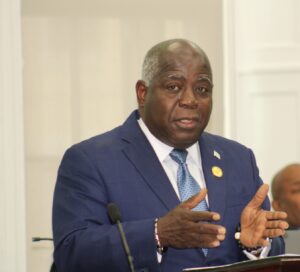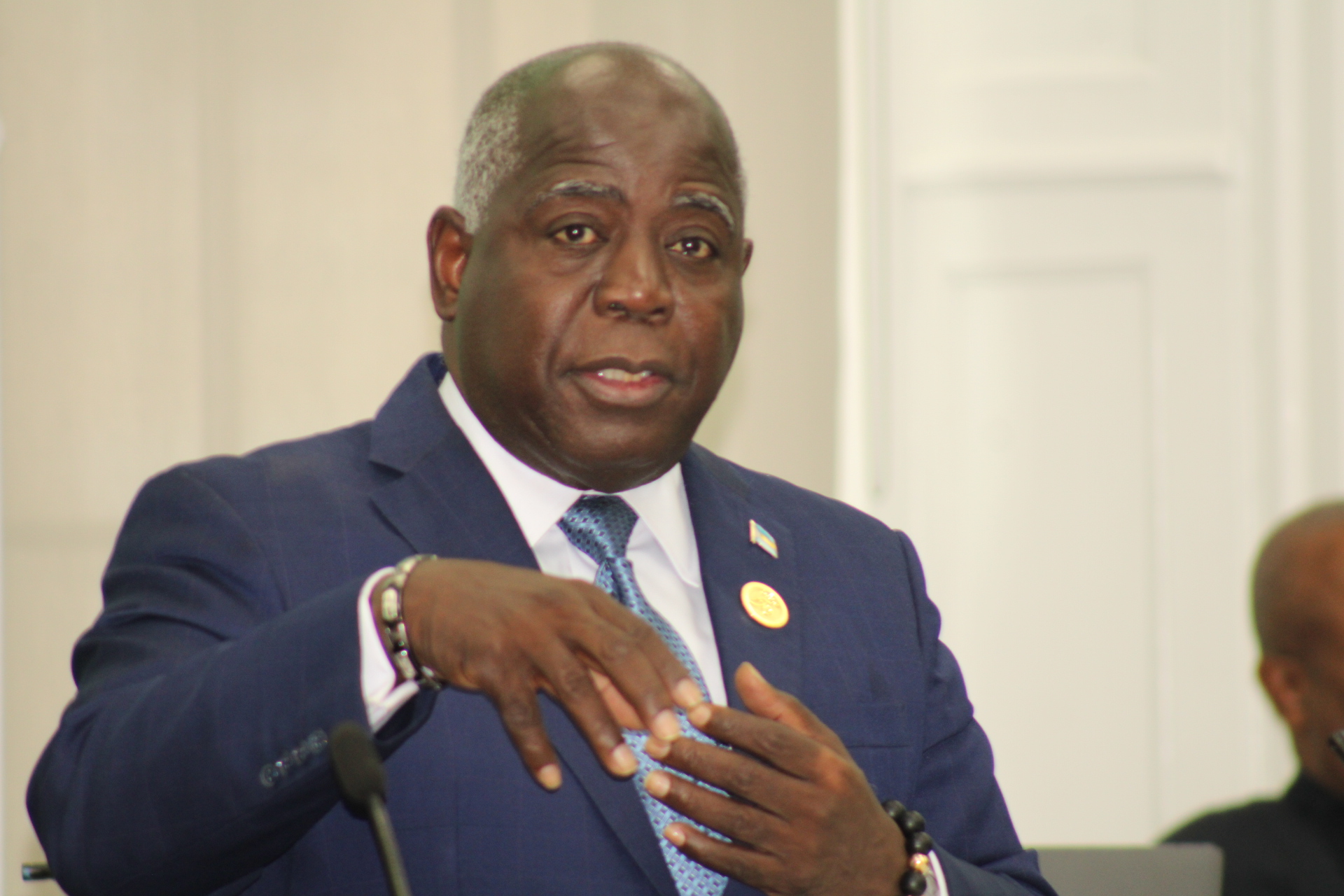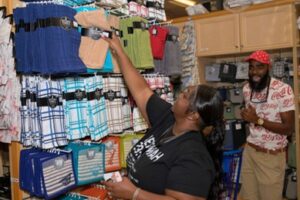Addresses rapidly evolving consumer needs in the digital era providing better protection for Bahamian consumers, said Prime Minister Davis
NASSAU, The Bahamas – During his Communication on the Consumer Protection Bill of 2023, Prime Minister and Minister of Finance the Hon. Philip Davis termed it a “significant piece of legislation” designed to enhance the rights of consumers across The Bahamas.
“This Bill is for all Bahamians, from the young mother budgeting for her family’s groceries, to the retiree investing his hard-earned money in a new home appliance,” he said, in the House of Assembly.
“Our individual households, our communities, and our economy depend on the integrity and fairness of trade,” he added. “Over the years, the Consumer Protection Act, Chapter 337C, has served as a firm foundation in ensuring fairness in our markets. However, in an era of digital transactions, global markets, and rapidly evolving consumer needs and products, it’s time for us to strengthen our laws, to adapt and to better protect the interests of Bahamian consumers.”
Prime Minister Davis pointed out that the proposed amendments directly correspond with his Government’s “Blueprint for Change” and “Economic Plan”, and reflected its belief that consumer protections were critical to economic development, poverty reduction, and social well-being.
“Our economic growth depends upon a market which encourages healthy competition, drives innovation, and ensures customer satisfaction,” Prime Minister Davis stated. “At the heart of this new Consumer Protection Bill is a commitment to restructuring and reorganizing the existing provisions for better clarity and comprehension.”
“The Bill aims to expand definitions, refine the functions of the Consumer Commission, and modernize the ways in which the Commission operates,” he added. “These changes are driven by a commitment to transparency and by aligning our policies with best international practices.”
Prime Minister Davis noted that his Government’s focus on transparency supported a market environment in which all players, big and small, could operate, grow and prosper in a manner that was regulated and fair.
He added that his Government was also enhancing the ways consumers can lodge complaints.
“Under the new Bill, consumers can make complaints even while outside The Bahamas, and we are expanding the list of who can make a complaint on behalf of the complainant,” Prime Minister Davis said. “These changes reflect our commitment to inclusivity and accessibility, ensuring that all Bahamians have a voice and can seek redress when necessary.”
Prime Minister Davis pointed out that, in a world that was increasingly digital, his Government recognized the need to streamline processes and make it easier for consumers to give evidence. To that end, he said, the Bill included provisions to allow for virtual testimony, which will expedite investigations and support convenience for consumers.
“The proposed legislation also empowers the Consumer Commission to issue Advisory Notices in situations where harmful practices to consumers are identified,” he added. “We believe these notices will serve as a valuable tool in preventing harmful business practices and educating consumers about potential risks.”
Prime Minister Davis noted that a significant change under the new Bill was the mandatory licensing and registration of providers. Failure to comply will result in penalties, encouraging businesses to operate within the boundaries of law and promoting a culture of accountability, he added.
“The Bill includes stringent provisions against misleading and deceptive conduct, harassment, and coercion,” he said. “We want to create a marketplace where consumers can engage with confidence and without fear.”
“A critical aspect of the Bill is the restriction of pyramid selling and the obligation for businesses to state the full costs of goods or services,” he added. “These measures will help ensure that consumers are not exploited or deceived.”
Prime Minister Davis stated that the Bill seek to repeal sections that no longer serve their purpose, including those on approved and non-approved services and businesses offering repair services. Updating the laws to respond to changed conditions, he added, allowed his Government to ensure the people were served effectively.
“As we continue to usher The Bahamas into the digital age, this Bill also enhances our ability to oversee distance selling and payment arrangements,” Prime Minister Davis said. “With the growth of online commerce, it’s vital that we maintain robust checks and balances, ensuring that every transaction is fair and transparent.”
“Additionally, the Bill expands on the powers of the Minister to make necessary regulations to protect consumers effectively,” he added. “This is crucial as it provides us with the flexibility to adapt and respond swiftly to emerging challenges and opportunities in the marketplace.”
The enactment of the Bill signaled a “significant shift” in his Government’s approach to consumer protection, Prime Minister Davis said. He added that they were aiming for an inclusive economy where everyone had access to safe, quality goods and services at a fair price.
“The Bill goes beyond enhancing the rights of consumers; it is about improving the lives of Bahamians,” Prime Minister Davis said. “It’s about ensuring that when a young Bahamian entrepreneur sets up his first business, he does so in a marketplace that values fairness and transparency.”
“It is about ensuring that when a Bahamian family invests in a new home, they do so with the confidence that their rights as consumers will be respected and protected,” he added. “It’s about creating an environment where businesses thrive on the principles of fair competition and customer satisfaction.
rights as consumers will be respected and protected,” he added. “It’s about creating an environment where businesses thrive on the principles of fair competition and customer satisfaction.
Prime Minister Davis noted that consumer protection was not just about trade, it was about people.
“It is about building a nation where everyone, regardless of their social or economic standing, can confidently participate in the marketplace,” he said.
“In a broader sense, it’s about the kind of country we want to be,” he added. “A country where trust is the cornerstone of our marketplace, where businesses and consumers interact with mutual respect and understanding. A country that values and upholds the rights and dignity of every individual.”
Prime Minister Davis said that, through that Bill, his Government aimed to empower consumers to make informed decisions, to assert their rights, and to seek redress when those rights are violated. That, in turn, will encourage businesses to uphold the highest standards of integrity, fostering a vibrant and fair economy, he added.
“The Consumer Protection Bill is about building a Bahamas where consumers are informed, businesses are accountable, and the marketplace is a space of fairness and trust,” Prime Minister Davis said. “It’s about creating a culture of consumer rights and responsibilities, where every transaction is an opportunity to demonstrate respect and fairness.”
“This bill is more than just legislation — it is a testament to our commitment to the Bahamian people,” he added. “It is about ensuring our nation’s prosperity and our people’s well-being.”
“It is about creating an economy that values and protects its consumers, a resilient, inclusive, and fair economy.”
Prime Minister Davis said that, in tabling the Consumer Protection Bill 2023, his Government were making a strong statement about the future it envisioned for The Bahamas.
“As we discuss and debate this bill, let us keep at the forefront of our minds the people we serve – the Bahamian people,” he said. “Let us remember that this Bill is not just about rules and regulations, it is about their lives, their rights, and their future.”
“I am proud to present this Bill, confident that it will set the stage for a more secure, equitable, and prosperous Bahamas.” (BIS Photos/Ulric Woodside)


















